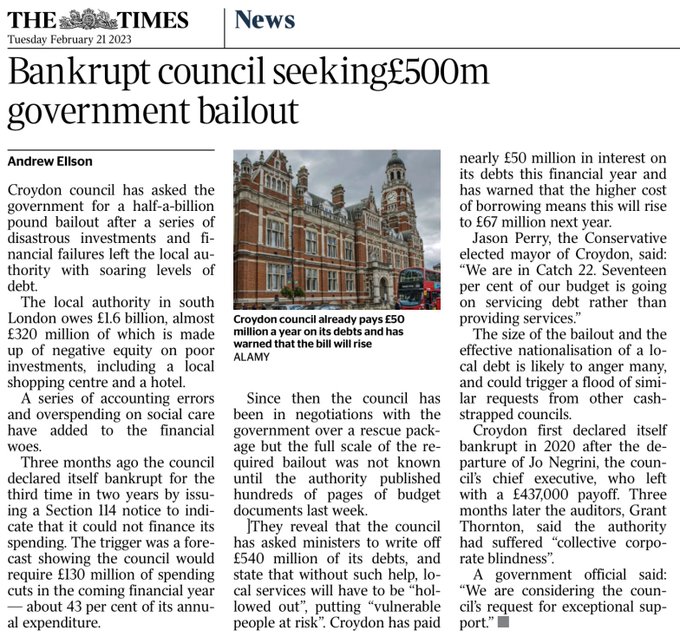-
Posts
12,180 -
Joined
-
Last visited
Content Type
Profiles
Forums
Events
Posts posted by Saving For a Space Ship
-
-
Dieselgate: Millions of ‘extremely’ polluting cars still on Europe’s roads, says report
The research group that first exposed the scandal say ‘it’s not over’ and that governments must act
-
53 minutes ago, Sackboii said:
Now I see why you have your username and avatar. 😉
Raise the shields !🙂
-
Just an idea, but perhaps an extreme one.
Due to the ferral youth / theft problem of them nicking the pipes / white goods / kitchen units / before the tenants move in (as mentioned by EA) , could you demolish the bottom front wall inc front window & door (likely have to be replaced anyway)
Then secure the back door / window and insert an insulated metal wall shipping container type volumetric modular building on rollers (made to fit the space) in through the front with battery / gas bottle power, so the tenany could move in straight away.
This would provide a more secure living space while work was done on the rest of the house. A temp wall could be installed after container was inserted
-
Ousted Persimmon boss sets up new venture with his wife
Exclusive: Jeff Fairburn, who was forced to leave housebuilder after outrage at £82m bonus, registers ‘credit granting’ business
-
on a related note re: the Japanese property market.. this was from 2 days ago
QuoteYou could cook while on the toilet: a night in one of Tokyo’s micro-apartments The tiny homes, which measure just nine square metres – or three tatami mats – are the architectural answer to rising rents https://www.theguardian.com/world/2023/mar/20/you-could-cook-while-on-the-toilet-a-night-in-one-of-tokyos-micro-apartments
-
Developers sign Gove’s building safety contract
Thirty-nine of the country’s biggest developers have signed the contract providing relief for thousands of leaseholders and tenants
https://www.gov.uk/government/news/developers-sign-goves-building-safety-contract
QuoteGrenfell contractor company among 11 facing ‘ban’ on building for failure to sign remediation pledge
The government has revealed the names of 11 developers that failed to sign its contract to fix fire safety defects, and face being frozen “out of the housebuilding business unless and until they change course”.
The government has revealed the names of 11 developers that failed to sign its contract to fix fire safety defects, and face being frozen “out of the housebuilding business unless and until they change course” #UKHousing
The details in this story were accurate as of 15 March 2023, and the article names developers that had not signed at this stage. Some may since have signed if you are reading this story at a later date.
The house builders and developers that did not sign the agreement by yesterday’s deadline include Rydon Homes, the development arm of Rydon Group. Rydon Maintenance, its contracting arm, was lead contractor for Grenfell Tower.
It also includes Galliard Homes and Lendlease, both major developers which have partnered with housing associations on large schemes.
Galliard is one of the largest developers in London, while Lendlease has a pipeline of 30,000 units in the UK. A spokesperson for the latter said it was considering the contract and would confirm its position by early April.
Rydon said it believes it should be treated as smaller builder, who are not subject to the current ultimatum.
The list is completed by Abbey Developments, Inland Homes, Telford Homes, Dandara, Ballymore, Avant, London Square and Emerson Group (Jones Homes).
Inside Housing understands Ballymore is working on the contract’s final details and will sign soon, while London Square said its lawyers were working to reach an agreement with government.A spokesperson for Dandara said it would sign imminently, while Galliard said it was working through procedural matters and intended to sign and Telford Homes also said it would sign (see box below).
READ MORE
 Gove says builders must sign or find ‘new line of work’ amid questions over scope of cladding contracts
Gove says builders must sign or find ‘new line of work’ amid questions over scope of cladding contracts
Michael Gove, the housing secretary, had issued all major builders with a six-week ultimatum to sign contracts agreeing to pay for the removal of unsafe materials on properties taller than 11 metres that they had developed.
Speaking in the House of Commons this afternoon, Mr Gove said his promised Responsible Actors Scheme would be published next week, which would mean those that have not signed can no longer build homes in England.
“Those companies will be out of the housebuilding business in England entirely unless and until they change their course,” he said.
“They will not be able to commence new developments in England or receive building control approval for work that is already underway.”
Asked when this sanction would take effect, Mr Gove said details of the scheme would be provided next week. He added: “I want to allow some of the 11 who have not yet signed a little bit of leeway in order to ensure that they live up to their responsibilities.
“The letters that I’ve written to the directors of the companies concerned, I think, will help to concentrate their minds in order to ensure that they have a chance to sign before we [introduce the provisions].”
He said that officials were in “discussions with several [among the 11 that had not signed] who are making progress towards signing”.
However, he added: “I am concerned that some companies do not appreciate the grave nature of the responsibility that they bear.
“I’ll be writing to major investors in these firms to explain the commercial implications of the directors’ current decisions. I’ll write to local authorities and building inspectors to explain these developers’ projects may not be started or signed off.”
Responding to a later question, he explained that work on site for any ongoing projects would have to pause. “We will make sure their shareholders and their investors pay the price for the responsibility of their directors,” he said.
Singling out Galliard, after a question from Clive Efford, the Labour MP for Eltham, Mr Gove said: “Galliard is one of the companies that have been the most recalcitrant throughout.Other companies have done the right thing and they’ve done so with a willing heart, but Galliard have held out, they’ve briefed against the department and all the rest of it.
“So now it will be the case that unless they sign, Galliard will face those consequences and their business model will be fundamentally challenged by the legislation that we have passed in this house.
“So ultimately, if you have a company like Galliard, whose owners, directors and investors are determined not to play ball, then the consequences will come.
“And I want to be clear with the honourable member and clear with this house that Galliard will be facing consequences if they do not act.”
Galliard is a major developer, particularly in London, describing itself as the city’s “leading property developer”. According to its website it has 6,905 homes under development and a pause in its developments would have major consequences for the industry in the capital.
It has numerous developments which have required remediation work, such as New Capital Quay in Greenwich
related from 1 month ago ..
QuoteCall to sanction cladding suppliers that made £7.5bn profit since Grenfell disaster
Manufacturers of insulation installed on the tower have yet to agree a voluntary funding scheme to fix dangerous buildings - In January last year, Gove said he would not let building material firms that were making huge profits “off the hook”.
A year later, no scheme has been agreed.. The association said last year there were “unanswered questions” and more work was required on the scope of the works.
-
THE WOLF STREET REPORT: Free Money Turned Brains to Mush. Now Some Banks Fail
-
Disaster hits BMW, VW, Toyota & Honda - millions of cars sit idle
-
reddit thread on same article
Homeowners pull properties from sale after buyers make low-ball offers
https://www.reddit.com/r/HousingUK/comments/11svqnc/seems_sellers_are_pulling_out_from_low_offers/
-
FT - Investors slash Fed rate rise bets on fallout from Silicon Valley Bank collapse
Goldman Sachs predicts central bank will pause its tightening later this month due to banking system stress
-
39 minutes ago, Blobsy said:
Ahh just like the old days. Bring me anarchy.
Hello old hpc friend...
-
US banks sitting on unrealized losses of $620 billion
https://edition.cnn.com/2023/03/12/investing/stocks-week-ahead/index.html
aopologies if mentioned
-
21 hours ago, Timm said:
The Ways and Means Account perhaps.
The scratch & dent account 🙂
Edit.. Question.. if there can be no bailout for the banks like in 2008, will there be Margin Calls for resi house & commercial premises owners ? If so, how quickly
-
On 10/03/2023 at 12:10, nero120 said:
Well I'm not an expert, but how does retail banking make money?
40% overdraft fees ?
-
Bank Stocks Got Wacked: Between a Rock and a Hard Place as Banks Run Out Free Money
by Wolf Richter • Mar 9, 2023 • 18 Comments Oh dearie, those bonds.
-
-
Landlords accused of ‘making up stories’ in drive to change UK tax rules
Lobbyist who warned of landlord ‘exodus’ found to have acknowledged to allies sector is actually growing
-
Crown heights affair - Galaxy of love (1978) 12 inchyou gave me love - Crown heights affairTOPPOP: Crown Heights Affair - Dancin' https://www.youtube.com/watch?v=t7r4HE2iYec
-
South Korea’s housing crunch offers a warning for other countries
A bizarre rental system is not helping
Quoteuying the house in 2021 might be one of the biggest regrets of my life,” says Kim Myung-soo, a 33-year-old whose home in Jamsil, eastern Seoul, has fallen in value by about $400,000. His wife is 33 weeks pregnant and Mr Kim does not know how he will repay the mortgage. He had planned to wait for prices to rise before selling the property to pay off the loan.
Mr Kim is not alone in his worries. Across the rich world, property markets look precarious. Few are in as bad shape as South Korea’s. House prices fell by 2% in December alone, the biggest monthly drop since official figures began in 2003. The slump has been particularly brutal for apartments in Seoul: prices are down by 24% since their peak in October 2021.
South Korea’s market offers a glimpse of what may lie ahead elsewhere. The Bank of Korea (bok) began raising interest rates in August 2021, seven months before the Federal Reserve and almost a year ahead of the European Central Bank. The benchmark rate now sits at 3.5%, a 14-year high, after officials raised it once again in January.
The broader economy is feeling the pinch. Private consumption fell by 0.4% in the fourth quarter of 2022. And exports, which dropped by 17% year-on-year in January, have hardly cushioned the blow. They were hit by a collapse in semiconductor orders at the end of a pandemic-era boom in electronics sales. This sluggishness will only add to the drag on house prices.

There are other sources of stress, too. Household debt reached 206% of disposable income in 2021, well above even the 148% in mortgage-loving Britain. Some 60% of South Korean housing loans are floating-rate, in contrast with America, where most lending is on fixed terms. As a result, household finances are squeezed more quickly when rates rise. The danger is that buyers like Mr Kim turn into forced sellers—something he says he will try to avoid at all costs—meaning a slide in house prices becomes a collapse.
This risk is enhanced by the country’s bizarre rental system, known as jeonse. Many tenants pay huge lump sums to landlords, often 60-80% of the value of a property, which are returned after two years. In the interim the landlord can invest the cash as they wish. The system is a relic of South Korea’s rapid industrialisation, when mortgages were harder to attain.
In a downturn, some landlords are forced to make firesales to reimburse departing tenants, having invested in risky assets, including more housing, and lost the money. Stories about sudden defaults and vanishing “villa kings”, owners of dozens of rental properties, proliferate.
South Korea also demonstrates how high household debt and asset prices can constrain monetary policy. Opinion is split about whether housing-market frailty, and the hit to household incomes, will stop the bok raising rates further. Oxford Economics, a research firm, thinks the bok will keep going. Nomura, a bank, expects it to reverse course in May, and cut the benchmark rate to 2% by the end of the year.
Most countries are not as exposed as South Korea. But some, including Australia, Canada, the Netherlands, Norway and Sweden, share the same mix of high household debt and frothy property prices. All began raising rates after South Korea, and have further to go before the pressure feeds through. They are in for a rocky ride.
-
National Empty Homes Week 2023 : Monday February 27th - Sunday March 5th
https://www.actiononemptyhomes.org/national-empty-homes-week
-
Puts me in mind of Shotgun Houses in the USA.
I love the way they call them 'Lodges' . yes, lodge it up your a....
QuoteA shotgun house is a narrow rectangular domestic residence, usually no more than about 12 feet (3.5 m) wide, with rooms arranged one behind the other and doors at each end of the house.
Wikipedia https://en.wikipedia.org/wiki/Shotgun_house#:~:text=A shotgun house is a,each end of the house.
-
-
On 22/02/2023 at 08:36, regprentice said:
Croydon need to cut total spending by 43% just to cover the interest on the debt
i remember Aberdeen council being in a similar position, though needing much smaller cuts. They had buildings they couldnt afford to open, but they couldnt afford to let the staff go, one example was a public ice rink where the staff were still paid to come to work but the building was closed to customers.
This is the kind of nonsense that will really hit people living under councils like croydon when these collapses crystalise - when paying the wages of an ice skating instructor with no customers comes before covering their social care budget for example.
How scandal-hit Croydon council went bust with £1.6bn debt
Failure after failure is highlighted by a review that suggests police investigate possible misconduct in public office
-
Labour controlled from 2014 to 2022 Croydon council goes bust





BBC examines Rental Health with a series of special programming across Radio 4, 5 Live and BBC News
in House prices and the economy
Posted